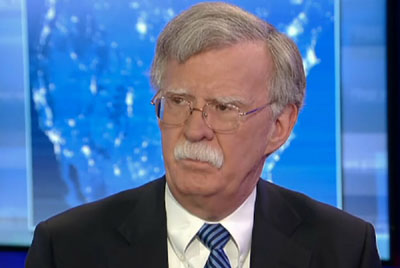by WorldTribune.com Staff, February 21, 2019
U.S. national security adviser John Bolton has reportedly headed to Seoul ahead of next week’s summit between President Donald Trump and North Korean leader Kim Jong-Un.

Citing two Trump administration officials, CNN reported on Feb. 21 that Bolton will travel to South Korea this week for “a round of consultations.”
Seoul has not confirmed the report, though it has been speculated that Bolton would meet with South Korean National Security Office chief Chung Eui-Yong.
Bolton has a long record of skepticism about prospects for successful negotiations with North Korea on denuclearization.
The leftist government of President Moon Jae-In in Seoul has unilaterally enacted substantial concessions to the North and is said to favor parallel actions by the United States.
Related: Retired S. Korean generals slam Kim-Moon ‘fake peace’, ‘collapse of security’, Feb. 4, 2019
This policy has frustrated some security advisors to the White House who favor maximum pressure on Pyongyang from U.S. allies.
Trump and Kim will start their two-day summit in Hanoi on Feb. 27.
“I don’t think this will be the last meeting by any chance,” Trump told reporters at the White House on Feb. 20.
“The sanctions are on in full,” Trump said. “I have not taken sanctions off. I would love to be able to, but in order to do that, we have to do something that is meaningful on the other side.”
Political analysts in Seoul said U.S. and North Korean negotiators are still struggling to reach a consensus on what “denuclearization” means ahead of the Trump-Kim meeting.
“For the United States, denuclearization means that the North completely ends its nuclear program and this includes the North’s decision to hand over a list of nuclear experts and uranium and plutonium enrichment facilities and allow U.N. nuclear watchdog officials into the North for thorough inspections,” said Yang Moo-Jin, a professor at the University of North Korean Studies in Seoul.
But for North Korea, “denuclearization” means Washington stops protecting South Korea. It does so currently by stationing some 28,500 troops in the South. As a reciprocal step in exchange for its initial actions to dismantle some of its missile- and nuclear-test facilities, the North is hoping to get some “substantial concessions,” Kim Yoo-Chul wrote for The Korea Times.
Check Out Geostrategy-Direct __________ Jump Start the U.S. Media
